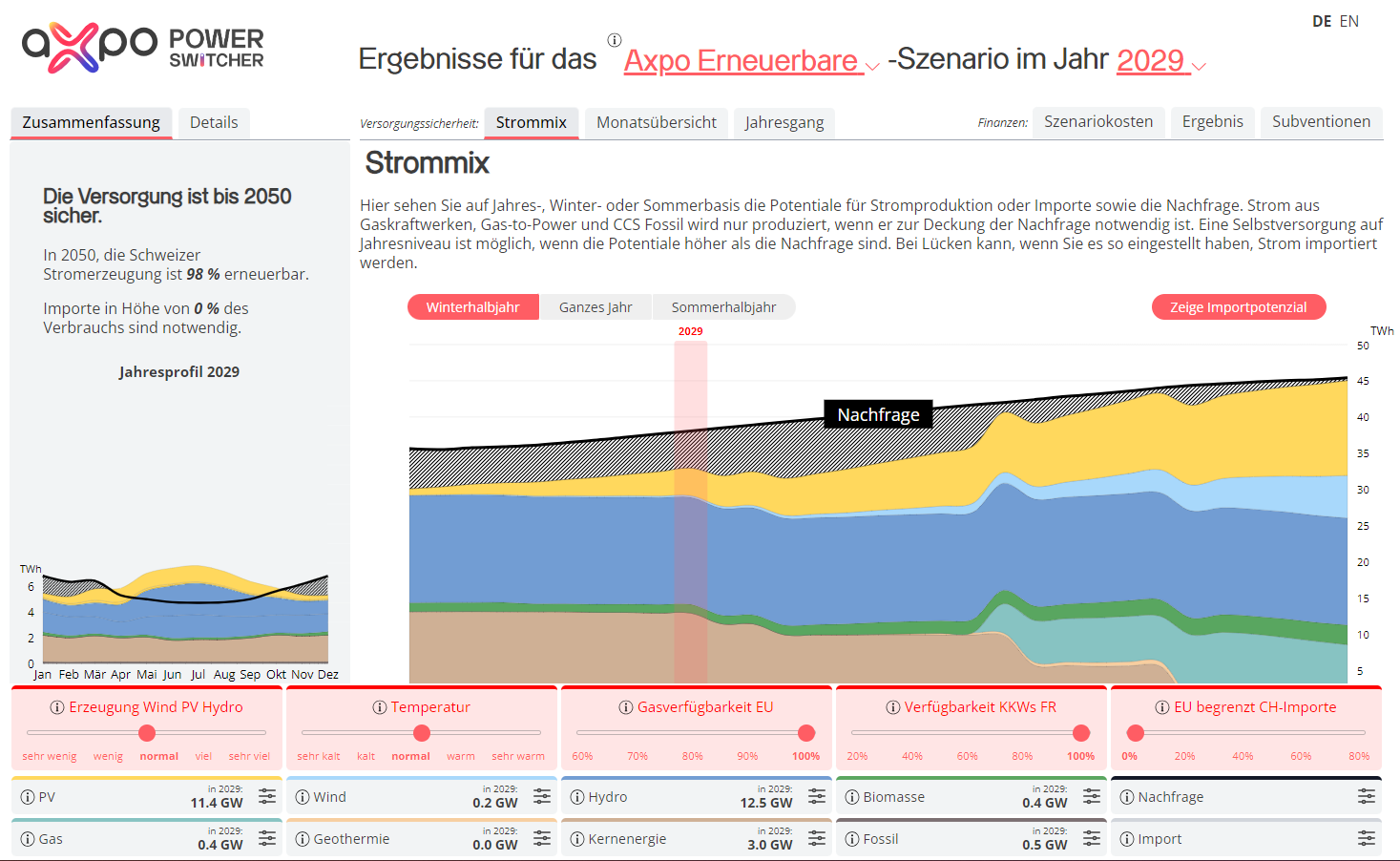27.06.2025 | Security of supply and free choice of provider
Electricity agreement: what it means for consumers
The Swiss Federal Council has presented the electricity agreement with the EU and the planned changes to Swiss law. The electricity agreement will better integrate Switzerland into the EU internal electricity market, which will strengthen security of supply. The adoption of EU legislation will also give all consumers freedom of choice of supplier and bring corresponding savings. An overview.
On 13 June, the moment finally arrived: the European Commission and the Swiss Federal Council published the EU-Switzerland electricity agreement that had been intensively negotiated over the past year and kept secret until now. The electricity agreement is intended to better integrate Switzerland into the EU electricity market, but requires Swiss legislation to be brought into line with the EU legal framework (EU acquis). On the same day, the Swiss Federal Council also launched the consultation process for the planned revisions to Swiss legislation. These measures will define Switzerland's electricity future if Parliament and, if necessary, the Swiss people approve the electricity agreement and the overreaching package.
Strengthening security of supply
It is essential for consumers that the electricity supply is guaranteed at all times. The case of Spain a few weeks ago is a prime example of the uncertainties and damage that can arise in the event of a large-scale power outage. The fact that Switzerland currently enjoys a very high level of security of supply is due not only to its domestic production capacities but also, in particular, to its good technical integration into the continental European electricity grid. However, in recent years, the lack of an EU-Switzerland electricity agreement has given rise to ever greater challenges. For example, Switzerland is not fully integrated into the EU's capacity calculations and there is a risk that it will not be taken into account under the 70% rule, which the EU has introduced to strengthen electricity flows between EU member states. This is accompanied by the latent risk that EU neighbouring countries will reduce their border capacities with Switzerland and thus Switzerland's import capacity. In addition, Switzerland is currently excluded from the EU's balancing energy platforms, which makes it more difficult to deal with imbalances within the country.
An EU-Switzerland electricity agreement would remedy these challenges. Switzerland would be better integrated into the EU internal electricity market and could participate in the relevant bodies and committees. The electricity agreement also includes a promise by both sides to cooperate in the event of electricity supply crises and to refrain from adverse interventions in cross-border electricity flows. For consumers, better integration means greater security of supply at lower costs.
Full electricity market liberalisation
Under the electricity agreement, Switzerland undertakes to open its electricity market to households and other small consumers. Regardless of the agreement, full liberalisation of the electricity market is long overdue. It will enable all consumers to choose cheaper suppliers and benefit from a wider range of products. For an average household that is currently tied to an expensive supplier in the supply area and will be able to switch to a low-cost supplier in future, savings of more than CHF 1,000 per year are possible. In addition, all customers would have access to dynamic energy tariffs, enabling them to contribute to system stability by managing their consumption and benefiting from lower costs.
Even with market liberalisation, there will still be a universal service ("Grundversorgung) in future, as also forseen by EU law. Small consumers will therefore be able to remain with their local supplier for their universal service. However, according to the Swiss Federal Council, the right to a universal service will in future only apply to customers with consumption of less than 50 MWh (comparison: average household: 4.5 MWh). Larger consumers will choose exclusively between the various market products. In the universal service, regulation will largely continue in accordance with the Electricity Act. This means that tariffs would continue to be based on the procurement and production costs of the suppliers and monitored by the Swiss regulatory authority ElCom. It would be possible to switch to and from the universal service at any time. However, switching fees would be charged for switching during the year in order to compensate suppliers for purchases already made or necessary at short notice.
The Swiss Federal Council is planning accompanying measures to protect consumers. In doing so, it is largely adopting EU law. Firstly, electricity suppliers will have to register with ElCom in future and meet certain requirements (e.g. customer service in Switzerland and sufficient human resources). Secondly, there will be certain minimum requirements for the content and structure of contracts. Thirdly, ElCom will provide an independent comparison portal for electricity supply contracts. Fourthly, an ombudsman's office will be set up to mediate in disputes over electricity supply contracts. Finally, ElCom will monitor the effects of market liberalisation, on the basis of which the Swiss Federal Council can take additional measures. It will also observe working conditions in the electricity sector, an area that goes beyond EU law and thus represents a so-called Swiss finish.
Elimination of minimum feed-in tariff
Consumers with their own solar power systems are unlikely to be pleased, since the minimum feed-in tariff for renewable electricity, which is supposed to be introduced in 2026 under the Swiss Electricity Act, would be abolished under the EU-Swiss electricity agreeme. In line with EU law, electricity fed into the grid will in future only be remunerated on the basis of hourly market prices. On the one hand, this will avoid false incentives to feed solar power into the grid during periods of negative prices or system stress. On the other hand, the subsidy associated with a minimum feed-in tariff at the expense of the basic supply will be eliminated. Negative effects on the profitability of solar installations could be offset by support instruments such as the one-off payment. Parliament is also currently working on an adjustment to hourly remuneration as part of the acceleration decree, but with the minimum feed-in tariff being retained.
Indirect effects
The electricity agreement contains many other changes for the Swiss electricity market, but these will tend to affect consumers indirectly. Firstly, various EU laws will become directly applicable, covering areas such as market organisation, trading and more technical requirements (known as network codes and guidelines). For example, greater unbundling of the larger distribution network operators will be required. Secondly, Switzerland has committed to bringing its electricity reserves and support instruments for renewable energies into line with EU law in future. Thirdly, the electricity agreement sets out certain institutional requirements, such as the dynamic adoption of EU legislation. This means that any changes to EU law would also apply in Switzerland in future or be incorporated into the EU-Switzerland electricity agreement. It should be noted that the EU is planning to improve consumer protection, increase price certainty and turn consumers into more active “prosumers”.
Risk of overregulation
For consumers, the electricity agreement means greater security of supply and freedom of choice, which are positive aspects overall. However, the introduction of accompanying measures and the adoption of detailed EU legislation also carry the risk of overregulation with corresponding economic costs. Implementing the agreement in as pragmatic and streamlined a manner as possible can mitigate this risk somewhat. At the same time, however, the EU-Switzerland electricity agreement also offers opportunities to dismantle existing red tape. In particular, free choice of supplier for all consumers would open up the possibility of significantly reducing the regulation of basic supply. It is to be hoped that politicians and authorities will maintain discipline and seize the opportunities.




.jpg)





